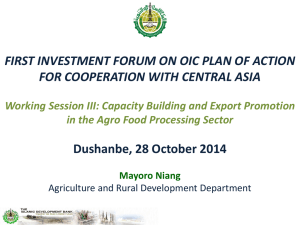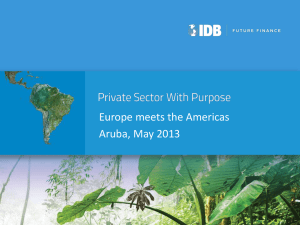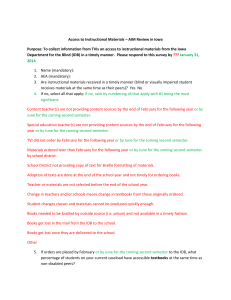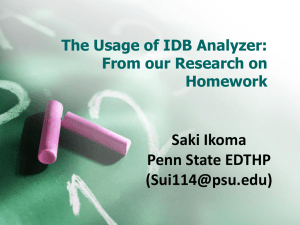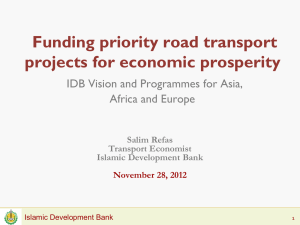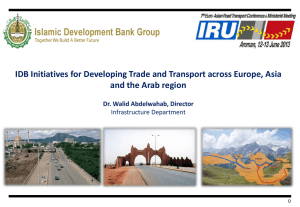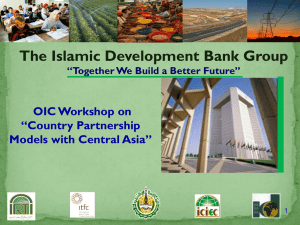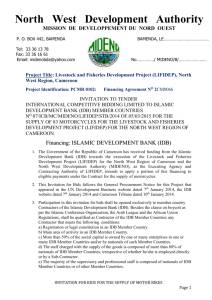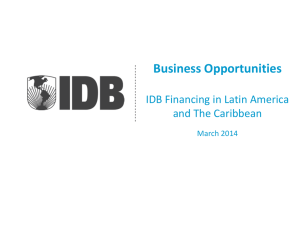ECO plus Albania - Islamic Development Bank
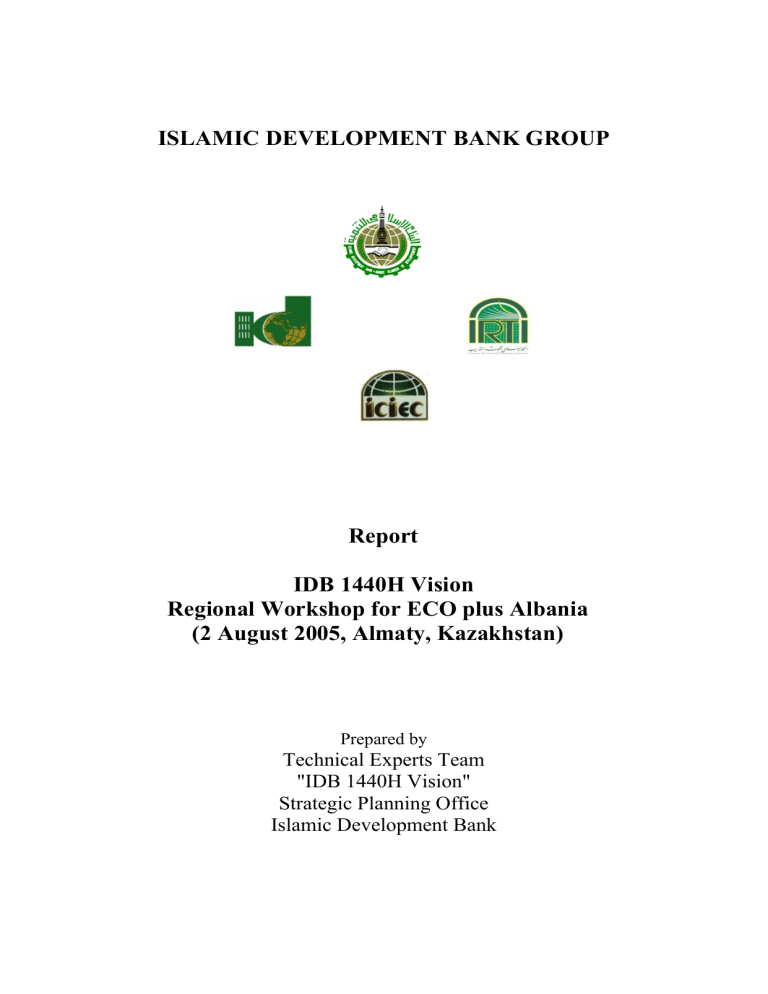
ISLAMIC DEVELOPMENT BANK GROUP
Report
IDB 1440H Vision
Regional Workshop for ECO plus Albania
(2 August 2005, Almaty, Kazakhstan)
Prepared by
Technical Experts Team
"IDB 1440H Vision"
Strategic Planning Office
Islamic Development Bank
TABLE OF CONTENTS
SUMMARY REPORT
REPORT
3
6
T HE W ORLD IN 1440H AND B EYOND : R EGIONAL P ERSPECTIVE 6
S TRATEGIC C HALLENGES FOR THE R EGION AND THE U MMAH 8
K EY D EVELOPMENT N EEDS AND IDB G ROUP ' S F UTURE R OLES 10
ANNEXES 14
LIST OF PARTICIPANTS
REGIONAL WORKSHOP PROGRAM
WELCOMING STATEMENT BY THE PRESIDENT
2
Summary Report of the “IDB 1440H Vision”
Regional Workshop for ECO plus Albania
(2 August 2005, Almaty, Kazakhstan)
Introduction
The Regional Workshop for the Economic Cooperation Organization (ECO) and
Albania was held in Almaty, Kazakhstan on 2 August 2005. The meeting was chaired by H.E. Tengku Datuk Dr. Mohamed Azzman Bin Tengku Sharifudin, representing the Chairmen of the “IDB 1440H Vision” Commission. The aim of the Workshop was to solicit ideas and views from eminent visionaries in the region who could shed light on long-term development issues, challenges and prospects that could impact on the region, the Ummah as well as on IDB activities in 1440H and beyond. The Workshop was attended by representatives from 9 countries, Muslim communities from nonmember countries, diplomatic corps, IDB 1440H Vision Commission, Board of
Executive Directors, Management, Regional Office, technical experts team and other partners. The discussions that took place were summarized under three broad categories as follows.
1.
The World in 1440H and Beyond: Regional Perspective
1.1.
New geopolitical and economic realities a.
New emerging powers in the east. b.
Competition with China. c.
The region can be a battlefield for major powers (US, Russia, and
China). d.
Emergence of new small states.
1.2.
Political instability/religious extremism may continue
1.3.
Post 9/11 developments a.
Increasing Tensions among civilizations b.
Image of Islam—radical vs. moderate
1.4.
Globalization and its negative impacts a.
Moral and values crises. b.
Poverty and inequality will continue
1.5.
Historical ties with Russia and Europe will continue
1.6.
Russia and China can be important partners in development.
1.7.
Conflicts related to energy and water among countries in the region.
1.8.
ICT as a facilitator for globalization and enabler for economic development
2. Strategic Challenges for the Region and the Ummah
2.1.
Transition and transformation into new global market economies a.
Increasing the role of the private sector. b.
Developing entrepreneurial capabilities.
2.2.
Strategic geographical location (link between Europe and Asia and major powers China and Russia)
3
2.3.
Landlocked countries—development of integrated transportation and communication network.
2.4.
Maintain Islamic identity and culture with consolidated sovereignty.
2.5.
Debt burden relief.
2.6.
Access new markets in China and Russia.
2.7.
Agricultural Development a.
Food Security b.
Decrease cultivation and transit of opium
2.8.
Development and efficient use of natural resources a.
Water b.
Energy Resources c.
Mineral
2.9.
Technological innovation and independence.
2.10.
Reduce dependency on dominant world currencies.
2.11.
Removal of physical and non-physical barriers to integrate economies.
2.12.
Enhance trade/investment among member countries
2.13.
Diversification of economies away from oil and gas. Exploit strengths in each country to complement each other.
2.14.
Emphasize the cooperative and charitable ideals of Islam for poverty alleviation.
3.
Key Development Needs and IDB Group's Future Roles
3.1.
Infrastructure development –transportation and communication, motorways, and railroads.
3.2.
Development of certain cluster sectors a.
Oil and gas sector b.
Hydro-electric power generation c.
Aerospace industry d.
ICT Sector e.
New value-added industries
3.3.
Encourage and be proactive in private sector development
3.4.
Extend IDB programs to non-member countries, particularly in: a.
Trade financing when dealing with Russia. b.
Scholarship support for students going to Russia. c.
Other IDB windows.
3.5.
Assist poverty reduction and equitable distribution of wealth through a.
Education b.
Public health and clean water c.
Housing access d.
Microfinancing and supporting SMEs
3.6.
Enter into strategic alliances with other MDFIs and other regional organizations including ECO.
3.7.
Act as a catalyst to enhance a.
Investment and FDI among member countries b.
Trade among member countries.
3.8.
To engage in policy advice and use technical assistance and exchange programs. a.
Help legislative reforms (for transition economies). b.
Exchange ideas/knowledge from advanced to other countries.
4
c.
Introduction of banking laws.
3.9.
Take lead in developing the Islamic financial industry that is: a.
A viable and efficient financial system. b.
More flexible and agile financing without diluting the Islamic identity. c.
Take leadership role in developing culture based institutions like zakat and waqf . d.
Establish institutional structure for consolidating collection and distribution of charities (in the post-9/11 era).
3.10.
Provide more concessionary financing and grants.
3.11.
Develop strategic thinking and planning capacities internally to assist countries in this area.
3.12.
Focus on human capital development.
3.13.
Establish educational centers of excellence/Regional universities.
3.14.
Increase resource mobilization to meet member countries’ needs. a.
Organize donor conferences. b.
Replenishment of funds periodically, particularly for concessionary financing.
3.15.
Developing internal capacity to meet the proposed role of the IDB with a view to: a.
Improving corporate governance and transparency. b.
Increasing efficiency within the Bank—lower costs of operations. c.
Empowering regional offices and have country representatives in all member countries. d.
Strengthening the Strategic Planning Office (SPO) and the Islamic
Banking Office (IBO). e.
Simplifying rules and procedures in the Bank and improve the operational efficiency. f.
Setting goals and time lines for doing business with MCs (projectize and productize).
5
Report of the “IDB 1440H Vision”
Regional Workshop for ECO plus Albania
(2 August 2005, Almaty, Kazakhstan)
I. Introduction
1.
The Regional Workshop for the Economic Cooperation Organization (ECO) and
Albania was held in Almaty, Kazakhstan on 2 August 2005. The meeting was chaired by H.E. Tengku Datuk Dr. Mohamed Azzman Bin Tengku Sharifudin, representing the Chairmen of the “IDB 1440H Vision” Commission. The aim of the Workshop was to solicit ideas and views from eminent visionaries in the region who could shed light on long-term development issues, challenges and prospects that could impact on the region, the Ummah as well as on IDB activities in 1440H and beyond.
2.
The Workshop was attended by 39 eminent personalities and visionaries from the region, representing 9 countries, Muslim communities from non-member countries, Excellencies ambassadors and representatives of the diplomatic corps of member countries accredited to the Government of Kazakhstan, one member from the ‘IDB 1440H Vision Commission’ (H.E. Mr. Alimardonov
Muhammedievich, the Chairman of the National Bank of Tajikistan ), H.E. Dr.
Selim C. Karatas, the honorable member of the IDB Board of Executive
Directors, IDB Management, directors of departments/offices, technical experts team and other partners from ISIS and MIMOS (see Annex-1 for the list of participants). The full-day Workshop was organized into an opening session, followed by four plenary sessions (see Annex-2 for the workshop programme)
3.
H.E. Dr. Ali Soliman, the CEO of the Islamic Corporation for Development of the private sector (ICD), delivered a welcoming speech, on behalf of H.E. the
IDB President (see the Annex-3 for the copy of the speech). Before the plenary sessions began, a power-point presentation on the “IDB Member Countries, the
ECO Region and the IDB Group: Strategic Vision” was delivered by the
Strategic Planning Office (SPO) of the IDB Group.
4.
The discussions that took place were presented after the summarized highlights, under the following three broad categories.
II. The World in 1440H and Beyond: Regional Perspective
New geopolitical and economic realities
5.
The emergence of new global political and economic powers in the East such as
China and India will have impact on the Ummah and particularly the region, given the geographic location and strategic importance of the CIS countries.
Therefore, these countries need to position themselves to take advantage of the economic opportunities arising from these new realities.
6.
Nonetheless, competition with China is also going to increase .
6
7.
The region can be a battlefield for major powers (Russia, US, and China).
In addition to attracting major world powers to the strategic resources of the region
(particularly oil and gas resources), these global powers will likely intensify their political competition in the region, given the historical ties as well as the geographic location of the region.
8.
Consequently, the tendency towards the emergence of new small states will further take roots, among competing groups in the region.
Political instability/religious extremism may continue
9.
In part, political instability arising from religious extremism may exacerbate the political instability and social tensions in some countries of the region.
Post 9/11 Developments.
10.
Civilizations’ conflict - The post 9/11 environment has increased the tensions between the Muslim world and the west. This trend is likely to continue in the future, despite efforts made by other institutions to promote dialogue between the perceived competing civilizations.
11.
Tensions between Islam and west may escalate given the negative image of
Islam and Muslims, projected by the Western Media.
Globalization and its negative impacts.
12.
Free flow of information and global ideas resulted in both positive and negative social and cultural norms. The rise of material satisfaction and private freedom coupled with the neglect of family values, social values and moral behavior contributed to global moral and values crises.
13.
Similarly, income inequalities and severity of poverty and deprivation will continue to increase, given their direct association with globalization
Historical ties with Russia and Europe will continue.
14.
Historically, the CIS countries have had links with Russia and Europe, given their geographic location and this is likely to continue in the future. But these countries are landlocked .
Russia and China can be important partners in development.
15.
Being landlocked, most of the CIS countries need access to markets, including the emerging dominating economies of China, India and Russia. In this respect, there is a need to enhance cooperation and foster strategic relationships with these emerging powers
Conflicts related to energy and water among countries in the region.
7
16.
The growing importance of energy resources offers opportunities as well as threats to the region. Cooperation among these countries in efficient extraction and utilization of such resources is among the key challenges facing the region.
17.
Of emerging importance is the need to coordinate efficient use of water resources in the region, with the view to learning from good practice in efficient management of non-renewable resources.
18.
ICT as both a facilitator for globalization and enabler for economic development.
19.
The paradigm shift of exploiting knowledge-economy poses a developmental challenge coupled with the recognized role of ICT as a key source of innovation to sustain economic development.
III. Strategic Challenges for the Region and the Ummah
Transition and transformation into new global market economies.
The preceding paragraphs suggest, inter alia , the importance of leveraging KICT4D, with particular emphasis on the quality of human resources, as a necessary condition to transform these economies into new market economies. At transitional stage, structural reforms coupled with judicial and institutional reforms should be deepened further, with the view to:
20.
Increasing the role of the private sector.
21.
Developing entrepreneurial capabilities.
Strategic geographical location.
22.
CIS are in the heart of Eurasia and can link between Europe and Asia and major powers such as China, India and Russia. Russia and China are expected to become important partners in development of the regional economies.
Landlocked countries — development of integrated transport and communication network.
23.
After the collapse of the Soviet Union, the prevailing transit systems that were present are getting more and more difficult to use and modernize.
24.
In deciding to rebuild transport corridors, there is a need to look at the feasibility of various transport/communication corridors and examine the costs, security, other risks and economic viability to find the most efficient route.
Maintain Islamic identity and culture with consolidated sovereignty.
25.
Distinction between Islam and terrorism/violence - There is a need to counter the negative image of Islam and Muslims, being projected by the Western Media, with a view to articulating the moderate image of Islam and portraying inclusive nature of the religion. Such efforts will also strengthen pride; identify solidarity and cultural affinity of Islam.
8
Debt burden relief
26.
Debt in some countries of the region is very large and comparable to that in countries with high debt burden. Assistance to these countries needs to be reexamined at the prevailing state of the art, with emphasis in offering more concessionary financing and grants to the region.
Agricultural Development
27.
Food security programs through technological innovation and education to achieve self-sufficiency are among the key challenges of the region.
28.
There is a need to decrease dependence on cultivation of opium and reduce the use of the region for its transit.
29.
Development and efficient use of natural resources. The region is endowed with enormous natural resources, the key challenge is to efficiently utilize these resources to diversify these economies, particularly in: a.
Water b.
Energy resources. c.
Minerals
Technological innovation and independence.
30.
The gap in science and technology between the Ummah and the West need to be addressed in coping with these rapid changes.
31.
Reduce dependency on dominant world currencies.
32.
Access new markets in China and Russia.
Removal of physical and non-physical barriers to integrate economies.
33.
Infrastructure bottleneck (particularly in communication and transportation) prevents the region from participating in globalization and reaping its benefits;
34.
Enhance trade/investment among member countries
Diversification of economies away from oil and gas.
35.
There is a need to diversify the economies away from the oil and gas in some
CIS countries. The region needs to avoid becoming over dependent on oil and needs to diversify its economies.
36.
Exploit strengths in each country to complement each other.
37.
Emphasize the cooperative and charitable ideals of Islam for poverty alleviation.
9
IV. Key Development Needs and IDB Group's Future Roles
38.
Infrastructure development – transport and communication, motorways, and railroads
Development of certain cluster sectors.
39.
There is a need to accord high importance to and expand the scope of project financing.
40.
Given the highly educated labor force, some cluster of sectors can be developed in the regions. These include: a.
Oil and gas sector. b.
Hydro-electric power generation. c.
Aerospace industry. d.
ICT sector. e.
New value-added sectors, including cotton industries .
Encourage and be proactive in private sector development.
41.
Given the socialist background in the CIS countries and Albania, there is a need to promote the private sector in a more proactive way. The scope and size of private sector funding from IDB/ICD needs to be expanded significantly.
42.
Empowerment of private sector to confirm and recognize its genuine role as engine/prime mover of economic growth and development.
43.
The bank should be involved in financing the private sector directly, even without government guarantees.
44.
Encourage establishment of venture capital enterprises to stimulate technological innovation.
Extend IDB programs to include non-member countries.
45.
Given the historical trade relationship with Russia (currently granted the observer status in the OIC), the countries in the region cannot benefit from some trade financing schemes of IDB. IDB trade financing should be stretched to finance trade transactions of member countries of the region with non-member countries
(including Russia), because most of their trade are with them.
46.
Engage Russia in IDB work agenda/program. Russia is an important trade and economic partner of member countries from the region;
47.
Students under the scholarship program of IDB go only to member countries.
Countries like Russia that have a significant Muslim minority should be included in the list of countries where the students can go as they will be able to get education at low costs.
10
Assist poverty reduction and equitable distribution of wealth through non- conventional means
48.
As poverty is on the rise in many countries, there is a need help provide the following: a.
More funding for education b.
Support public health c.
Support facilities to provide clean water d.
Expand housing Access e.
Support the SMEs through microfinance programs, since most of the poor are employed in the informal sector.
Focus on human capital development and capacity building.
49.
There has been a lot of brain drain from the countries in the region to the West.
There is a need to reverse this trend by creating conducive environment within these countries and also in other MCs where these skills and knowledge are needed and IDB can assist in bridging this mismatch.
50.
The IDB can use its technical assistance to build capacity of the labor force of the human-resource poor countries. In this regard, the assistance can come from member countries with ascendant human capital.
Establish educational centers of excellence/Regional universities.
51.
Develop educational centers of excellence and universities in order to enable these countries to excel in various fields and enhance Islamic awareness there is a need to. In this respect, IDB can assist in establishing these institutions and facilitate collaboration among member countries to do so.
52.
Setting up R&D centers in the region, or encourage utilization of existing centers in regional and non-regional countries through technical cooperation programs.
Enter into strategic alliances with other MDFIs and other regional organizations including ECO.
53.
The IDB can assist is implementing national development schemes of member countries by coordinating, financing and technically assisting in this area, in collaboration with other MDFIs.
54.
Initiate and establish complimentary relationship with ECO, in conjunction with its vision for the region (ECO 2018 Vision);
55.
Co-financing projects with other MDFIs, because the financing needs of the member countries are enormous.
Act as a catalyst to enhance investment and FDI among member countries
56.
The Bank should facilitate movement of capital from capital-surplus to capitaldeficit countries to encourage intra- investment. For example, investments can
11
flow from the capital rich GCC countries to the CIS countries that have significant investment opportunities.
Increase Trade among member countries.
57.
Various physical and non-physical barriers are obstacles to increased trade among countries in the region. The Bank can assist in reducing these barriers to enhance trade.
58.
Establish IDB/OIC Trade Center that is functional and effective will help in promoting intra trade.
Engage in policy advice and use technical assistance and exchange programs.
59.
Technical assistance from IDB can be used to bridge gaps of ideas and knowledge from successful countries with track-record in sustained growth to others.
60.
Some transition countries like Afghanistan, CIS countries and Albania are building various institutions of market oriented economies. IDB can use technical assistance to introduce various legislative reforms to enable this transformation.
61.
There is a need to expand the use of ICT to different activities and use it to exchange and deliver knowledge among member countries. The IDB should focus on facilitating this exchange of ideas.
62.
There is a need to encourage and support market oriented policies.
63.
There is enormous demand for technical advice from member countries and IDB can assist in meeting such demands.
Take lead in developing the Islamic financial industry
64.
IDB should actively be involved in developing a viable and efficient financial system(s), in collaboration with other institutions involved in this area.
65.
Help develop Islamic banks in the region – given the rapid growth in demand for
Islamic banking, the IDB can use its expertise to help set up Islamic Bank’s in the region.
66.
The Islamic financial sector needs to be more flexible and agile to enhance financing without diluting its Islamic identity.
67.
The IDB can offer technical assistance in promoting Islamic financial industry through introduction of banking laws.
68.
The Islamic Banks Office has to be strengthened further in order to assist the
Islamic financial industry in an effective way.
Take leadership role in developing culture based institutions like zakat and waqf.
69.
The traditional institutions of zakat and waqf needs to be revived and used for poverty alleviation and development activities. The IDB can assist in reviving these institutions.
12
70.
The IDB can take an initiative to establish a Global Zakat Fund and find practical steps of implement it. The fund can transfer resources from relatively richer member countries as grants for poverty alleviation.
71.
Establish institutional structure for consolidating collection and distribution of charities (in the post-9/11 era).
Provide more concessionary financing and grants.
72.
Provide more and more concessionary financing and grants to help countries alleviate poverty.
73.
Develop strategic thinking and planning capacities internally to assist member countries in this area.
Increase resource mobilization to meet member countries needs.
74.
The IDB can organize donor conferences to raise funds for specific countries and causes from the richer member countries.
75.
As the activities of the Bank increases, there is a need to replenish the funds periodically, particularly for concessionary financing.
Developing internal capacity to meet the proposed role of the IDB
76.
Improve corporate governance within the Bank.
77.
Make the management decisions within IDB more democratic and transparent.
78.
Increasing efficiency within the Bank — lower costs of operations.
79.
Empowering regional offices in order to conduct its daily operations more efficiently and have close links with the member countries of the region.
80.
There is a need to have country level field representatives in all member countries and establish a network of field representatives for further coordination.
81.
Strategic planning is extremely important in this rapidly changing global environment and as such the Strategic Planning Office needs to be upgraded to a department with view to strengthening its internal capability and capacity to undertake such functions.
82.
The rules and procedures in the Bank need to be simplified and the operational efficiency improved.
83.
Setting goals and time lines for doing business with member countries (projectize and productize).
STRATEGIC PLANNING OFFICE, IDB GROUP
JEDDAH, KINGDOM OF SAUDI ARABIA
13
Annexes
14
Annex-1
IDB 1440H VISION
REGIONAL WORKSHOP (ECO + ALBANIA)
List of Participants
No. Name
GROUP – A (Members, IDB 1440H Vision Commission)
1. H.E. Tengku Datuk Dr. Mohd. Azzman bin Tengku Ibrahim, President / CEO, MIMOS
Berhad, Malaysia (representing the Chairman, IDB 1440H Vision Commission)
2. H.E. Mr. Alimardanov Muhammedievich, Chairman, National Bank of Tajikistan
GROUP – B (Representatives of Member Countries)
3. Afghanistan - H.E. Mr. Mustafa Mastoor, Director General of Budget Department, Ministry of Finance
4. Albania - H.E. Mr. Durim Kraja, Secretary General, Ministry of Economy
5. Azerbaijan - H.E. Mr. Rufat Mahmudov, Head of IFI Division, Ministry of Economic
Development
6. Kazakhstan - H.E. Mr. Askar Batalov, Vice-Minister of Industry and Trade
7. Kyrgyzstan - H.E. Mr. Zayir Chokoev, Head of Foreign Exchange Department, National
Bank
8. Tajikistan - H.E. Mr. Alisher Soliev, Director of Department on International Financial
Institutions, National Bank of Tajikistan
9. Turkey - H.E. Mr. Ali Cevik, Division Chief, Undersecretariat of Treasury
10. Uzbekistan – H.E. Mr.
Shukhrat Karakulov, Head of Project Preparation and Monitorint
Division, Central Bank of Uzbekistan
GROUP – C (Representatives of Muslim Communities in non-Member Countries)
11. H.E. Mr. Adalet Djabiev, Chairman of the Executive Board, Badr-Forte Bank, Russia
GROUP – D (Special Invitees)
12. H.E. Mr. Bolat Zhamishev – Chairman of the Finance Agency, Kazakhstan
13. H.E. Mr. Abdel Mawgood El-Hebashi, Ambassador of the Arab Republic of Egypt in the
Republic of Kazakhstan
14. H.E. Mr. Mehman Parast Ramin, Ambassador of the Islamic Republic of Iran in the
Republic of Kazakhstan
15. H.E. Mr. Hasan Riazi, First Secretary in the Embassy of the Islamic Republic of Iran in the
Republic of Kazakhstan
16. H.E. Mr. Ramadan Bzama, Charge d'Affairs of Socialist People's Arab Jamahiriya of Libya in the Republic of Kazakhstan
17. H.E. Mr. Dato' Than Tai Hing, Ambassador of Malaysia in the Republic of Kazakhstan
18. H.E. Brig. Mazhar Jamil, Defense Attaché of the Embassy of the Islamic Republic of
Pakistan in the Republic of Kazakhstan
19. H.E. Mr. Akbarsho Iskandarov, Ambassador of the Republic of Tajikistan in the Republic of
Kazakhstan
20. H.E. Mr. Turdikul Butayarov, Ambassador of the Republic of Uzbekistan in the Republic of
Kazakhstan
21. H.E. Mr. Yahya Al-Haj, General Director, ''Pet-Co'' Co.
No. Name
22. H.E. Mr. Mohammed Al-Otaiba, Chairman of ''Mohammed Al-Otaiba Group Est'' Co.
23. H.E. Mr. Kassenov Dulat, Financial Director, Wireline Oilfield Services
24. H.E. Mr. Popov Viacheslav, Chairman of Board of Director, GIS Co.
GROUP – E (Executive Directors, IDB)
25. Hon. Dr. Selim C. Karatas
GROUP – F (Management, IDB Group + Heads of concerned Department)
26. H.E. Dr. Ali Soliman, CEO/General Manager, ICD
27. Mr. Nik Zainal Abidin, Director, Regional Office (Almaty)
GROUP – G (Vision Technical Team)
28. Dato’ Mohamed Jawhar Hassan, Director General of ISIS, Malaysia
29. Mr. Huzaime Hamid, Senior Fellow, ISIS, Malaysia
GROUP – H (Secretariat – IDB Staff Members)
30. Dr. Mohd. Ghazali bin Md. Noor
31. Dr. Siddig Abdelmageed Salih
32. Br. Rauf Arshad
33. Dr. Habib Ahmad
34. Br. Kunrat Wirasubrata
35. Br. Mustafa Bosca
36. Sr. Alma Issabayeva
37. Br. Khaled Al-Dheeb
38. Br. Rashid Kadyrov
39. Sr. Sholpan Nurtayeva
Annex-2
Date
Tuesday,
2 August
Time Program
08:50 – 9:05 am
09:10 am
09:15 am
09:25 am
09:40 am
10:00 am
10:45 am
Arrival of Participants at the workshop venue /
Reception and Refreshments at the Holding Area
Recitation from the Holy Quran
Welcoming Remarks from IDB Group Management
(delivered by H.E. Dr. Ali Soliman, President/CEO, ICD)
Speech by H.E. the IDB Acting Governor, Kazakhstan
Presentation:
Brief on IDB Member Countries, the Region & the IDB
Group: Strategic Vision
Session I:
The World in 1440H and Beyond – Regional Perspective
Tea Break / Workshop Participants Group Photo
11:00 am
Session II:
Strategic Challenges for the Region and the Ummah
12:30 pm
02:00 pm
04:00 pm
Dhuhr Prayer / Lunch
Session III:
Key Development Needs and IDB
’ s Future Role
Tea Break
04:30 pm
05:15 pm
05:30 pm
Session IV:
Major Elements in IDB 1440H Vision
Concluding Remarks by the Chairman
Session Ends
Chairman of the Session: H.E. Tengku Datuk Dr. Mohd. Azzman bin Tengku Ibrahim
(President/CEO MIMOS)
Wednesday,
3 August
09:30 am –
12:30 pm
12:30 pm
Follow-up Technical Committee Meeting
Among officials of Bank Negara, ISIS, Central
Bank of Pakistan, MIMOS and IDB Group
Session Ends / Dhuhr Prayer /
Lunch
Annex-3
Welcoming Statement by IDB Group Management
IDB 1440 H Vision – Regional Workshop (ECO & Albania)
Almaty, Kazakhstan, August2, 2005
Your Excellencies
Hon. Tengku Datuk’ Dr. Mohammed Azzman bin Tengku Ibrahim
Hon. Murotali Alimardanov
Representatives of Diplomatic Corps present in Kazakhstan
Distinguished Participants
Ladies and Gentlemen
1.
I would like to take this opportunity to welcome all of you and extend my appreciation to members of the IDB 1440 H Vision Commission, members of the Diplomatic Corps present in Kazakhstan and all distinguished delegates from Member Countries and Muslim communities in non-Member Countries who are gathered here today to attend the IDB 1440H Vision Regional Workshop for ECO plus Albania.
2.
As you may know, your institution, the IDB Group has contributed to the socio-economic development of 56 member countries throughout its 30 years of establishment. Our successes are in the growth of project financing, intra-trade promotion, collaborative forums and initiatives as well as contribution to the welfare of Muslim communities in nonmember countries around the world. In short the IDB has strived to promote the agenda of poverty alleviation, the promotion of cooperation as well as promotion of Islamic Banking to its stakeholders.
3.
Against this background of achievements of the IDB and its investment in socio-economic development, the Bank and the member countries are witnessing unprecedented global developments in recent times. They
pose new challenges and opportunities for our member countries.
Consequently the IDB Group has taken this initiative to reposition itself as a response to these global developments.
4.
The “IDB 1440 H Vision” initiative began in Jeddah on Safar 5, 1426 H
(March 15, 2005) when a group of eminent personalities lead by H. E.
Tun Dr. Mahathir Mohamad, Former Prime Minister of Malaysia and
H. E. Professor Habibie, Former President of Indonesia, met to reflect on the world in 1440 H and beyond, and the strategic challenges for the
Ummah.
5.
In this context this Workshop today seeks your contribution through your ideas and experiences as to how the Bank will be able to serve its member countries and Muslim communities in the coming 15 years and beyond in the lights of strategic challenges facing the Ummah, given the resource base of its membership and how can we keep the IDB relevant to the changing conditions and needs of member countries.
6.
I would like to thank you once again for accepting IDB invitation to attend this major initiative of the IDB Group as well as your ideas for making the IDB 1440 H Vision Regional Workshop for ECO plus
Albania, a success.
7.
On behalf of the Bank, I pray that our gathering will contribute towards a long-term strategic vision of the IDB Group to serve the Ummah and the world, through effective partnership with the member countries and other stakeholders.
Almaty / August 2, 2005
